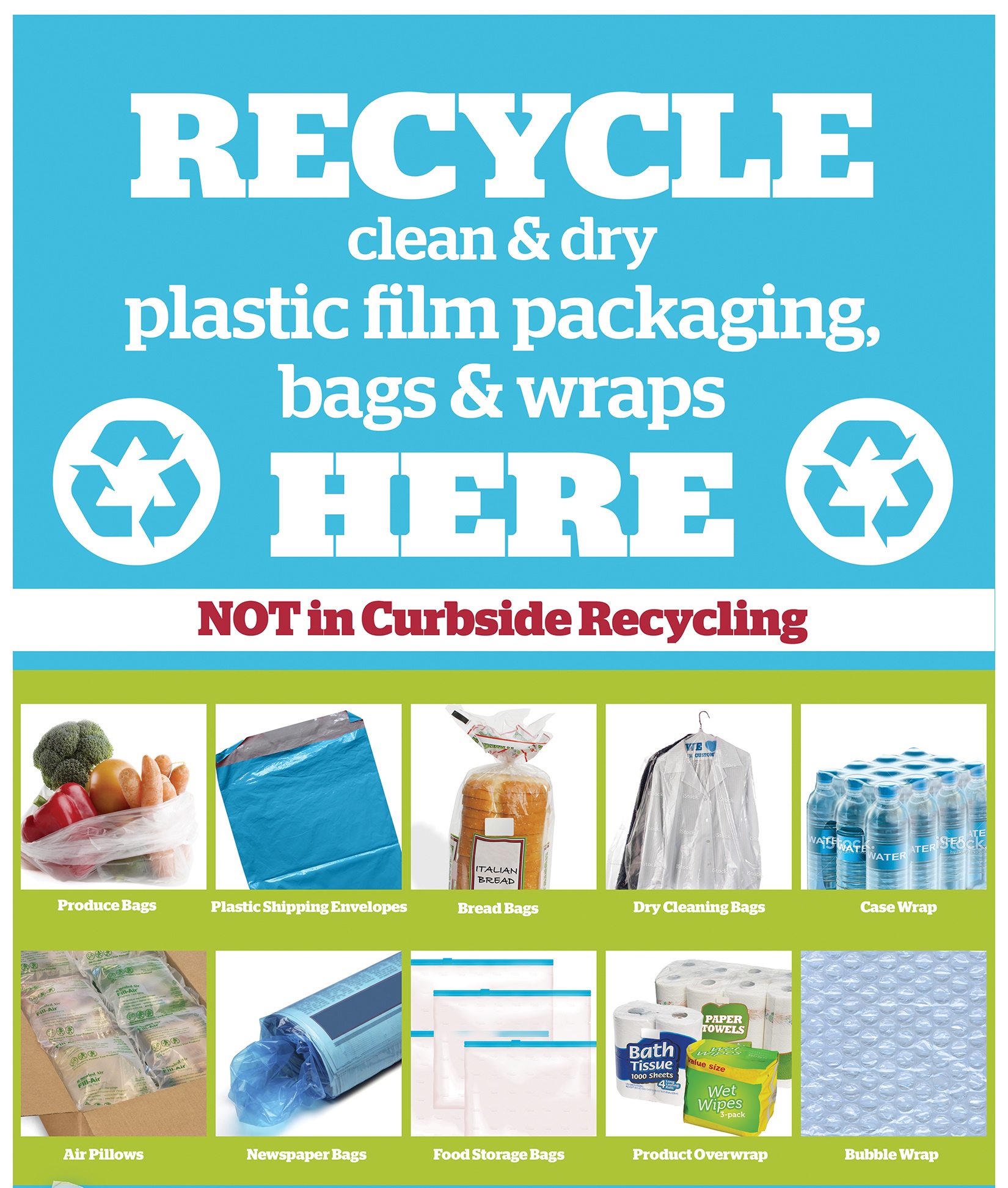RECYCLE: UNACCEPTABLE!
Three main items - plastic bags & wrap, styrofoam & paper shreds - are no longer accepted recyclables in Greenwich in order to reduce problems in processing & to avoid contamination.
PLASTIC BAGs, wrap & FILM PACKAGING
Plastic bags, wrap and film are no longer accepted recyclables in the Town of Greenwich. These materials are problematic because they become entangled in the recycling equipment during the sorting process causing costly delays and endangering workers.
RECYCLING PROGRAMS: TREX & WRAP
Although plastic bags, wrap and film cannot be put in your blue bin, special recycling programs exist to recycle them, including TREX and WRAP. These plastics are converted into decking and other products.
The program accepts air pillows, grocery & retail bags, case wrap, newspaper bags, bread bags, produce bags, food storage bags, wrap packaging (napkin, paper towel, bathroom tissue & diaper).
Do NOT include pet food bags, candy wrappers, degradable (compostable) bags, pre-washed salad bags, frozen food bags or material that has been painted or glued. Remove all tape and other adhesive, and bags should be clean and empty.
COLLECTION LOCATIONS
Special collection bin located at Holly Hill Transfer Station for these plastics.
Select grocery & retail stores will also accept plastic bags, wrap and film: ShopRite, Shop-N-Stop, Acme, Home Depot and Kings.
STYROFOAM: Nix the 6
Expanded polystyrene (EPS), commonly known by its trade name Styrofoam, is no longer recyclable either curbside or at the Holly Hill Transfer Station because of frequent contamination and little market value. Foam cups, egg cartons, peanuts, take-out containers, meat trays or any other type of EPS should not be put in the blue bin. Anything marked with the resin code #6 is not recyclable. Remember: NIX THE 6!
WHY IS POLYSTYRENE A PROBLEM?
The best approach is to avoid styrofoam altogether for your health & the environment! Foam products contain styrene, a chemical classified as a "reasonably anticipated to be a human carcinogen" by the National Toxicology Program and "probably carcinogenic to humans" by the International Agency for Research on Cancer. Chronic exposure to styrene also increases risk for depression, headache, fatigue & kidney dysfunction (EPA). Polystyrene products leach styrene into foods and beverages, particularly when exposed to heat or acids.
According to the 2016 Plastics Better Alternatives Now (BAN) List, polystyrene is one of the most common forms of plastic pollution in the environment. Foam is lightweight and is easily blown by wind or washed away by rain into water sources. It is also very brittle, and can break into small pieces that animals can ingest. Polystyrene is slow to degrade, and if disposed of improperly, the foam can absorb and leach toxic chemicals, contaminates that can work their way up the food chain to humans.
Styrofoam is made from petroleum, a non-renewable resource. Every step of its production involves chemicals of high concern to the environment & human health (Clean Production Action). Styrofoam production was rated as the 5th largest source of hazardous waste (EPA). The byproducts of incineration include air pollutants and ash that must be landfilled. It creates a trail of harmful pollution & waste for just minutes of use!
TIPS TO NIX THE 6
Ask that meat products be wrapped in paper, or bring your own container to the counter.
Chose fruits & veggies that are free from foam packaging.
Bring your own durable beverage cup or bottle.
Select eggs in paper cartons.
Ask your favorite grocery stores and food establishments to stop using this product. Advocacy goes a long way!
Support bans on polystyrene. Check out 5 Gyres’ interactive map to learn more about municipalities that have taken steps to eliminate EPS from their communities.
SHREDDED PAPER
Shredded paper is also no longer accepted by the Greenwich municipal recycling program. Do not put it in your recycling bin at home or toss it into the recycling containers at Holly Hill Transfer Station. This material is considered a contaminate at the recycling facility and the flyaway shreds litter the transfer station. The small airborne particles also create pollutants that are harmful to facility employees.
OPTIONS FOR SHREDDED PAPER
Consider blacking out sensitive information & recycling the paper whole, rather than shredding documents. Several options are available to residents to recycle paper shreds beyond the municipal program:
Special Paper Shredding Container at Holly Hill Transfer Station: There is a separate collection for shredded paper located near the recycling containers. Place shreds in paper bags rather than plastic.
Paper Shredding Day: This annual April event is organized by the Greenwich Recycling Advisory Board (GRAB) & Greenwich Green & Clean. Sensitive documents that contain personal information will be shredded on site by professional shredding service. Do not include envelopes, folders, newspaper, metal clips, plastic bindings, report covers, cardboard or binders. Materials must be boxed, not bagged. Nominal fee of $2 per box.
Professional Shredding Services: Many companies will shred your sensitive documents for a fee.
Other uses:
“Browns” for your compost pile
Packing material to keep items save in transport
Bedding material for small animals
Paper Shredding Event in April 2018 organized by GRAB & Greenwich Green & Clean


